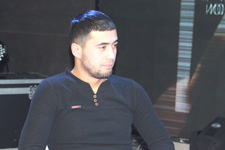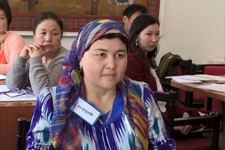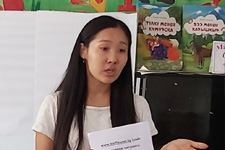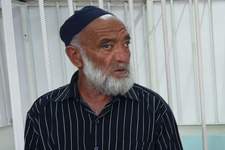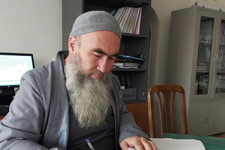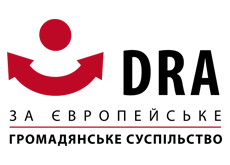Coronavirus in Kyrgyzstan: Orphanages, residential homes and psycho-neurological facilities do not have enough food supplies and personal protective equipment
According to the results of monitoring of residential homes for kids and psycho-neurological facilities of Chui province during the coronavirus outbreak in Kyrgyzstan.
Human rights movement “Bir Duino - Kyrgyzstan” alongside members of the Ombudsman’s Office on April, 13-14 visited orphanages, residential homes and psycho-neurological facilities located in Chui province. The main goal of their visit was to figure out out needs of these institutions during coronavirus outbreak in Kyrgyzstan.
Dmitriev boarding school of Chui province
It was closed during the visit. There was only one guard, but he called the manager. Manager said that residential home was closed for a quarantine period since March, 16 and 92 kids were sent back to families.
Krasnorechensk complementary boarding school
According to headmaster Meerim Madiiarova, 127 children in the age from 7 to 16 attend the school. They have mild mental handicap and behavioral variations.
39 kids left without parental care live in the school during quarantine period. They have classes only from 10 to 11 AM. Also kids of this school get 1000 som of allowance which stored on their saving accounts until the graduation. According to the headmaster, there is a sewing and carpentry workshop. Meerim Madiiravova believes that this school needs to be transformed into the family orphanage.
Madiiarova says that students do not communicate with other people during the quarantine period and follow all the needed safety rules. For example, teachers who live in Bishkek stay at home during the quarantine period. Currently only local staff members work in the school.
Human rights activists observation results: Director and staff members were not happy with the observation. According to the director, her institution is supervised by the Ministry of Education, and its their responsibility to come up with the alternative education programs and regulations to keep children safe during the emergency period.
From a distance we saw groups of girls, who were going from the sauna and they did not have facial masks. However director said that medical personnel and staff have safety clothes. We gave them three bags of safety clothes, two respiratory masks and special medical goggles.
Requirements: Despite the fact that school has some supplies, it is still ready to obtain any help for the students. They need food supplies, disinfectants and cleaning products. Kids also need fruits and vegetables. Any material and furniture can be donated to the sewing and carpentry workshop.
Chui boarding school for orphanages and kids left without parental care, Jany Jer village
Nazgul Musaeva became a headmaster on March 16, 2020. 150 kids in the age from 6 to 16 attend the school. 100 of them live there consistently, other 50 live in the nearby villages. Food supplies and other products were acquired by the tender.
Study goes in a normal way, because students live in the boarding school. 60 staff members work in the school, 19 of them as teachers, 9 - caretakers. 2 nurses provide medical assistance, but they temporarily don't have pediatrician.
Kids have temperature measurement twice a day since the beginning of quarantine. School territory is disinfected by chlorine outside and there is a wet cleanings twice a day. Ministry of Emergency Situations also helped to disinfect school’s territory. Staff members also had to create self made antiseptics for kids and facial masks. Outsiders are not allowed to visit kids.
Human right activists observation results: Kids walk in groups in school backyard not wearing facial masks and not following the rules of keeping distance.
Requirements: Antiseptics, special protective clothings for staff members, cleaning products.
Voenna-Antonovka orphanage for children without parents
Headmaster Masyl Askar and senior caretaker Galina Andrausova said that 101 kid live in this house. Their study goes in a normal way in two shifts. Their temperature being measured twice a day, everyone is healthy. Medical staff consist of pediatrician, psychologist and two nurses. Food is being acquired by tender, and they have enough supplies. Outsiders are not allowed to visit kids, observers had a talk with headmaster outside the territory of orphanage.
Requirements: Anticeptics and facial masks, 100 units.
Belovodsk special boarding school
It was closed during the visit. All the kids are in their families or custodians because of the quarantine. One kid is moved to the rehabilitation center in Bishkek. Study is conducted online. According to director, their building might be used as an observation place.
Belovodsk pre-school orphanage
School headmaster Anna Gorokhova said that the school is on quarantine since March, 16. 37 attend the school, among them HIV-positive. Medical personnel consist of a doctor and two nurses. Ministry of Emergency Situations disinfected the school territory twice. Food is being acquired by tender, fruits and vegetables are bought from private owners. Outsiders are not allowed to visit kids, observers had a talk with headmaster outside the territory of orphanage.
Requirements:
Powder, 48 kilos per month
Cleaning products for sinks and toilets, 12 units per month
Gloves and facial masks in any quantity
Protective clothings
Belovodsk psycho-neurological social institution
Aizada Asanova is a head manager. 218 kids in the age from 4 to 18 live in there. Medical assistance is provided by 3 doctors, 12 nurses and also there are 200 other staff members. Only 170 keep working because of quarantine. Institution has enough medical and food supplies. Outsiders are not allowed to visit kids, observerrs had a talk with manager outside the territory of institution. Building is disinfected by quartzing. If the quarantine period will be prolonged and staff members will have to live in the institution, there will be a need of extra food supplies. There is a person who has been tested positive for COVID-19 in this area, and this institute is going to take extra safety precautions.
Requirements:
Diapers for kids and adults
Disinfectants, 100 litres
Chlorine, 200 kilos
Facial masks, 1000 units
Gloves, 1000 units
Powder and soap
Food supplies
Tokmak psycho-neurological social institution #1, Iskra village
Headmaster Bakyt Satybaldievich informed about treatment of 267 men in the age of 18 and older. More than 60 need of extra care because they bedrided. Food is acquired by tender, and they have flour for another month. Medical supplies being bought each quarter. Administration still has some amount of antiseptics, but staff already run out of antiseptics provided by Ministry of Health.
Requirements:
Chlorine, 10 kilos for a month
Hypochlorite (45-65%), 40 kilos for a month
Disinfectants, 50 litres for a month
Antibacterial soap for 267 patients
Powder, 100 kilos for a month
Protective clothing, masks and shoe covers for 54 staff members
Flour, 1-2 tons
Any groats and sugar
Tokmak psycho-neurological social institution #2
Head manager was away during the visit, but we asked administration about their needs in online. About 200 people treated in the centre, 64 of them bedridden. They need diapers. There is an urgent need for medicals. Ministry of Health provided centre with small amount of antiseptics, but they run off.
Requirements:
Diapers, size 3-4, in any quantity
Antiseptics, 5 litres
Hand sanitizer, 10 units
Chlorine, cleaning products, in any quantity
Facial masks, 300 units
Gloves, 300 units
Urgent need for medicines azaleptin, azaleptol, carbamazepine, sibazon, cycodol, aminazine
Human rights activists observation results: These are the most vulnerable institutions left without effective and systematic support during crisis. Officials did not help them at the moment of observation.
They need medical supplies as well as technical equipment to support staff and patients and protect them from coronavirus.
In conclusion:
Monitoring showed that officials did not develop an effective program to effectively help vulnerable groups of people such as children without parents and people with disabilities or mental health issues.
Ministry of Health did not develop a unite program to prevent spread of coronavirus in such institutions, Ministry of Education did not give an alternative education program and management to control it.
Medical personnel do not have special protective clothings and respiratory masks. There is a lack of facial masks, kids and adults keep walking in groups without following the needed rule of social distancing.
There is a need to evaluate the ministers work of providing boarding schools and psycho-neurological institutions with protective equipment and food supplies during quarantine. We need to understand if these ministries are able to develop special programs in case of prolongation of quarantine.
Expert group of Ombudsman’s Office and Human Rights Movement “Bir Duino - Kyrgyzstan”.




